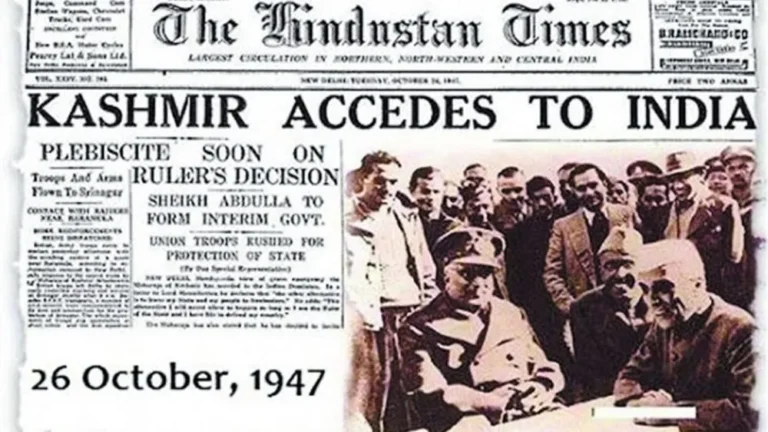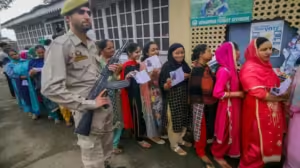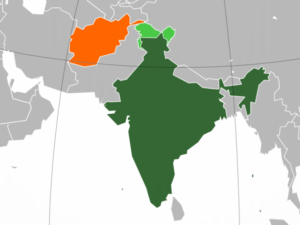By Syed Inam Ali Naqvi
In 1947, the princely state of Jammu and Kashmir, governed by a Hindu Ruler, possessed the authority, as granted by the Indian Independence Act, to opt for accession to either India or Pakistan, taking into consideration the religious composition, geographical factors and the will of its populace. On July 19th of the same year, the Working Committee of the All–Jammu and Kashmir Muslim Conference, holding a significant majority of Muslim seats in the Kashmir Assembly, passed a unanimous resolution, advocating for the alignment of the predominantly Muslim state with the emerging dominion of Pakistan.
Contrary to the popular sentiment, the Maharaja initially aspired for an independent status. Subsequently, after visits from the rulers of Faridkot, Kapurthala, and Patiala, accompanied by persuasive efforts from Lord Mountbatten and other Indian leaders, he shifted his stance and decided to accede to India. His shifting stance brought about a transformation in the dynamics of Kashmir, resulted in the suppression of Muslims and the settlement of Sikhs, RSS military cadres, and Patiala forces, with the purpose of ethnic cleansing of Kashmiri Muslims as they wanted to accede with Pakistan. This tumultuous period eventually led to a revolt against Maharaja in Poonch, resulting in the liberation of a substantial portion of State of Jammu and Kashmir by the Poonchis.
Subsequently, tribals arrived on October 21/22 to support their fellow coreligionists, ultimately contributing to the liberation of Muzaffarabad. Following the liberation of Muzaffarabad, the government of Azad Jammu and Kashmir was established on October 24th, 1947. Following the liberation of AJK, upon the arrival of the tribals in Srinagar, Maharaja sought refuge in Jammu and executed the Instrument of Accession on either the 25th or 26th of October, as written by various historians. The foundation of India’s claim over Kashmir lies in the Instrument of Accession. In this article, we shall thoroughly examine the legality and relevance of the Instrument of Accession.
It is essential to first acknowledge that the Vienna Convention on the Law of Treaties typically requires the registration of treaties with the UN Secretariat to become enforceable. The article 102 of convention stipulates, “Every treaty and every international agreement entered into by any Member of the United Nations after the present Charter comes into force shall as soon as possible be registered with the Secretariat and published by it.” However, a critical point of contention arises when considering the Instrument of Accession because it was never registered, potentially diminishing its significance.
Next, it is crucial to assess the capacity of Maharaja Hari Singh to sign the Instrument of Accession. While many scholars argue that, as the ruler of the State of Jammu and Kashmir, he possessed the authority to decide his state’s fate, the timing of the signing raises significant questions. The document was signed after October 24, 1947, when Azad Jammu and Kashmir (AJK) had declared its independence, and Maharaja had lost control over a substantial part of his state. In this context, one must ponder how he could legitimately make decisions on behalf of the state when a considerable portion had already been liberated, and a new government had been established before the Instrument of Accession.
Thirdly, if it is accepted that the Instrument of Accession is still relevant, it becomes imperative to examine the Article 2(1)(a) of the Vienna Convention on the Law of Treaties, which defines a ‘treaty’ as ‘an international agreement concluded between States in written form and governed by international law, whether embodied in a single instrument or in two or more related instruments and whatever its particular designation’. Historical records show that when the Maharaja sent the Instrument of Accession to Lord Mountbatten, Mountbatten responded with a letter in acknowledgment of the Instrument of Accession. In accordance with Article 2(1)(a) of the Vienna Convention on the Law of Treaties, it is essential to regard Mountbatten’s letter as an integral part of the treaty. In this letter, Mountbatten conveyed that, “It is my Government’s wish that as soon as law and order have been restored in Jammu and Kashmir and her soil cleared of the invader the question of the State’s accession should be settled by a reference to the people.” This inclusion of the clause “by a reference to the people” by Mountbatten suggests that the Instrument of Accession may not be final and irrevocable.
Moreover, the statements made by state officials carry legal weight, as evidenced in various instances where critical decisions were influenced by such statements or letters. In case of Kashmir, Indian Prime Minister Nehru, on October 31st, 1947 in his Telegram to Pakistani Prime Minister Liaqat Ali Khan said, “Our assurance that we shall withdraw our troops from Kashmir as soon as peace and order are restored and leave the decision about the future of the State to the people of the State is not merely a pledge to your government but also to the people of Kashmir and to the world.” In addition, Nehru wrote a letter to Liaqat Ali Khan on November 21st, 1947 in which he said, “Kashmir should decide the question of accession by plebiscite or referendum under international auspices, such as those of the United Nations.” On 25th November, 1947, Prime Minister Nehru of India made a statement of Kashmir in the Indian Constituent Assembly, in which he, inter alia, said: “In order to establish our bona fides, we have suggested that when the people are given the chance to decide their future, this should be done under the supervision of an impartial tribunal such as the United Nations Organisation. The issue in Kashmir is whether violence and naked force should decide the future or the will of the people.” This raises the question of why Mountbatten, in his letter to the Maharaja, and Nehru, in his radio broadcast and letter to Pakistani Prime Minister, mentioned making decisions with reference to the will of the people, if the Instrument of Accession was indeed final and irrevocable.
Lastly, the United Nations, a pivotal international body, has passed multiple resolutions in support of Kashmir, designating it as a disputed territory that must be resolved through a democratic process of a free, fair, and impartial plebiscite under UN auspices. The most significant was Resolution No. 47 of 21 April 1948, stipulating that “Noting with satisfaction that both India and Pakistan desire that the accession of Jammu & Kashmir to Pakistan or India be decided by the democratic method of a free and impartial plebiscite.”
Overall, in light of the unregistered status of the Instrument of Accession at the UN Secretariat, coupled with concerns surrounding Maharaja’s authority to endorse it, it becomes evident that the document’s definitive and irreversible nature is debatable. This debate gains further traction when considering the resounding assertions by Mountbatten and Nehru, emphasizing the ultimate determination of Kashmir’s fate through the will of its people. Additionally, the UN resolutions affirming Kashmir’s disputed status and advocating for a plebiscite underscore the fluid legal standing of the Instrument of Accession, adding complexity to its purported finality.








